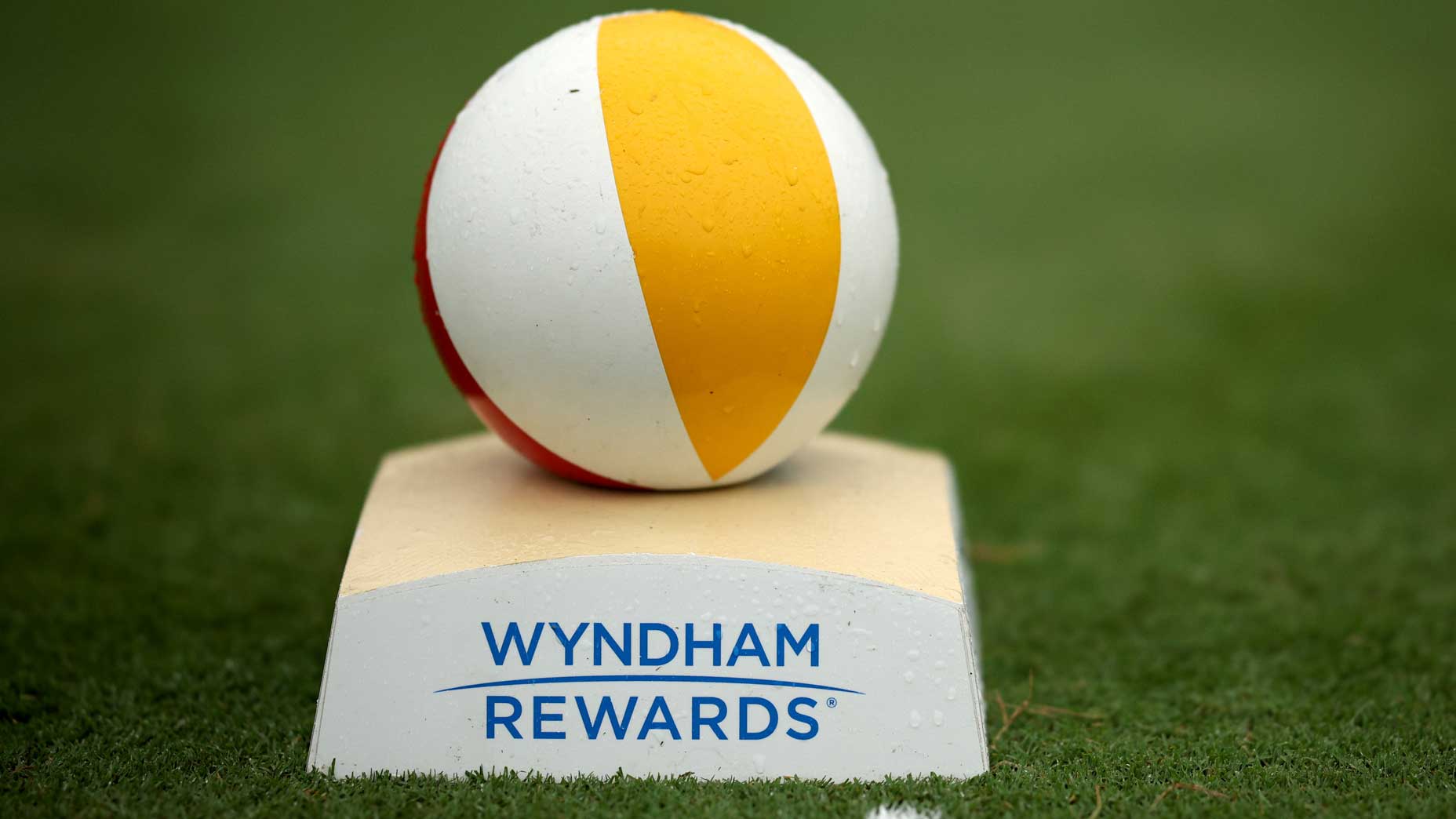So here we are: summer heat, a long, soft traditional American golf course, Tiger Woods, in the press tent, on the driving range, on the course, talking about the Ryder Cup, working on his feels, coming up with a game plan in an effort to win his fifth PGA Championship and his 15th major championship. He’s won the others at Medinah in 1999 and 2006, at Valhalla in 2000 and at Southern Hills in 2007. It’s always hot at the PGA. He’s won it four times in the heat, on hard courses with traditional set-ups. Here comes Bellerive, in the dog days of summer, St. Louis-style. Here it comes.
You remember his last outing. Not Firestone, where he never had anything, really. No, we’re talking about those heart-stopping minutes on Sunday at the Open Championship, when we let ourselves think about the prospect of him breaking this 10-year ohfer. The unthinkable. He was close at Carnoustie, for a while. It goes without saying that he’s playing his best golf in the last five years. You could make the case that the Tiger Woods we’ve seen this year is the most interesting version of the man and golfer we have ever seen. More frail, more open, more honest, less good at golf. More human.
All through the year, at every tournament in which he plays, you hear the low, plaintive voices of grown men rising above the din: “Love you, Tiger!” No matter how often you hear it, it’s striking. Woods is historically great, whether you measure him against other golfers, other athletes, other anythings.
Watching Tiger Woods move through a course and a round, without a wasted step or word, is a thrill for anyone who appreciates seeing a difficult thing done well. Woods has provided excitement in our lives in a way few others have. But does any of that suggest … love?
For most of the past quarter-century, we’ve had a lopsided deal with Tiger Woods. He pulled off all those shots, signed all those cards, kissed all those trophies and cashed all those checks. We got to watch, and to hear him say, “Sometimes you get a little lucky.” Who could relate to him? He was the ’27 Yankees, year after year. As he once told his wife, quashing a celebration after another win, “This is what we do.” He was a winning machine.

The stiletto parade came and went (late in ’09, early in ’10), then the painful (and needless) public mea culpa, followed by divorce. But nothing really had changed. When he won three times in 2012 and five times in 2013 it felt pretty much like business as usual. He won. We clicked over to Golf Channel and said, “He did it again.”
And now we are in the final full month of this summer of love. When he missed the cut at Shinnecock, a pall washed over the place. Then came Carnoustie. Woods stood on the 11th tee in the final round as the outright leader of golf’s oldest championship. Despite the high winds off the North Sea, there was no air.
He owned the tournament, the moment, every spectator, reporter and photographer, some of the players. Tiger’s two kids were on hand, dressed in mini-me red-and-black outfits, along with his girlfriend. Maybe Woods wanted it too much. Maybe he was not ready. He collapsed. His game fell apart, as scores of other elite players in that high-altitude place have done before him. This was a different, this was the more human Tiger Woods on full display. When he reached the home green, the outpouring of reverence—and maybe love—for the golfer and man from the game’s most empathetic fans was overwhelming. His hat came off—his father’s bald spot is more prominent now—and he waved grimly and with emotion. The new Tiger, playing not like the old Tiger, but better than he has in years.
The most on-the-ground, communal fan passion I have ever felt for Tiger came at the 1997 Masters, when he won by 12, in his first major as a pro. That is, until I attended the late-winter stop in Tampa, the Valspar. Woods was a 12th-hour entrant and the Tour’s hype department didn’t have time to add a third shift. But by Sunday, when Woods was two shots off the lead, the atmosphere was almost chaotic. All these men, exclaiming all this love. What was up with that? Likely more than we could know.
He’s carried a heavy bag practically his whole life and tried to make it look easy. The exhaustive Woods biography published this year shows how Tiger’s youthful winning, and the life it predicted, helped keep his parents together. What were the costs of that? How about the pressure of always having a camera on you, starting with Tiger’s appearance, alongside his father and Jimmy Stewart and Bob Hope, on The Mike Douglas Show at age two? Tiger had a deep bond with his father. But to what degree did that depend on Tiger winning with such regularity?
Earl taught his youngest son to look out for himself, and Tiger took it too far. In 2013, Woods found himself in three rules situations—Friday on 15 at Augusta, Sunday on 14 at the Players Championship and Friday on the first at the BMW—where he showed stunning self-absorption. That’s why Brandel Chamblee graded the year, despite Woods’s five wins, as an F. Woods and his people tried to bury the commentator, but Chamblee had it right. On those three occasions, Woods demonstrated a willful blindness that suggested desperation. Had Woods won that 2013 Masters, there would have been an asterisk on his major total forever.
As a competitive golfer, 2014 through the first half of 2017 were lost years for Woods. The chip yips, the walk-offs, the medical procedures.
Then came Memorial Day 2017, when Woods was arrested not far from his home in the middle of the night on a DUI charge. Police cameras—yet more cameras in his life—recorded it. Because of Florida’s broad Sunshine State laws, millions have seen it. There were five drugs in his system. The mug shot was a frightening sight. In his brief public remarks about the events that night, Woods has said he was self-medicating in the aftermath of his spinal fusion surgery. It would be nice to think of the night as a one-off, but it would be naïve. Far more likely, it was a night rooted in the accumulated pain of a great and difficult life. He checked himself into rehab.

You barely remember any of that, right? But if you ask people why they’re rooting for Tiger now, you hear this again and again: Everyone deserves a second chance. That’s what this year has been all about. Tiger Woods came out of a jungle, hungry and battered but in one piece, and we were so relieved just to see him we opened our arms wide. We went in for the hug and he, in his own evolving way, returned it.
Mark Soltau is a writer who has known and worked with Woods for decades. In 2004, in a video produced for American Express, Soltau, discussing a swing change Woods was making, made a telling observation: “Tiger is a very anal person who likes to be in control. And if he doesn’t feel he’s in control, that makes him antsy.”
Well, when police officers pull you over, you cede control to them. The Tiger Woods they recorded that night was not in control of himself. As part of his plea deal, Woods agreed to make himself available for random drug tests for a year and waived aspects of his Fourth Amendment rights, thereby allowing police to make unannounced searches of his home for illegal drugs. In other words, he gave up more control.
MORE: Previewing the PGA Championship
He hasn’t talked publicly about his experience in the rehab program, and he’s smart to be silent. But sometimes a stint in rehab is a first step in a reconfigured life. You learn to control the things you can control and let the other stuff go. It’s hard to know. What we do know is that we’re seeing Tiger this year as we have never seen him before.
Can he ever again be the golfer he once was? No. His dominance was borne in his putting and chipping and no golfer has ever putted and chipped better in his 40s than he did in his 30s or 20s. His body is changed. Can he win again? That’s a different question. Of course he can. Especially on a soft course against a second-tier field. Can he win the ones—the four majors—that mean the most to him? That’s yet another question. If he’s in contention this week, the CBS numbers will blow-up.
Arnold Palmer told me late in 2012 that he thought Woods had lost what Arnold called “the edge.” He doubted Tiger would win another major.
He was speaking from his own vast experience. He knew what it was like to lose the edge, the thing that makes you feel you can control your golf ball in the hairiest of situations. The feeling you are destined to win. But Arnold would be the first to tell you: there’s more to life than winning major golf tournaments. Here’s to Tiger’s next 40 years.
My first real glimpse of the new Tiger came on the Sunday of this year’s Honda Classic. Woods was semi-contending until he rinsed two balls late in the round. But he did not have the red-ass. No. He was playing pain-free golf again, with his two children nearby and in front of worshipful fans. He was competing. It seemed to be enough.
On that day Tiger’s age was 42 years, one month and 26 days. (We all do this thing called life one day at a time, right?) In the aftermath of a 12th-place finish, Woods was asked about his fourth-round playing partner, Sam Burns, a golfer half Woods’s age. Tiger processed the question in a nanosecond (as per usual) and said, “He played beautifully. Top-10 is big for him because it gets him into Tampa, next official start, a full-field event. He’s trying to build momentum and build his exempt status. Today and this week was a big step for him.”
The old Tiger would have been can’t-see-straight mad. But this Tiger Woods was evaluating the talent, dreams and career path of another player! But this was the new Tiger. Empathetic, for one thing. Grateful, for another. Soon after, he decided to go to Tampa himself. Amid the pandemonium there, he finished one shot back.
At the U.S. Open, Woods was asked how his life had changed since Memorial Day 2017. “It’s gotten better,” he said. Compensating for his father, Tiger does understatement well, and this was a subject he despises. Woods was arrested at 2:00 a.m. Sunrise in Jupiter, Fla., was four and a half hours later. Here comes the sun. The first day of the rest of his life. And now comes the first round of the remarkable year’s last major.
Michael Bamberger may be reached at mbamberger0224@aol.com.







